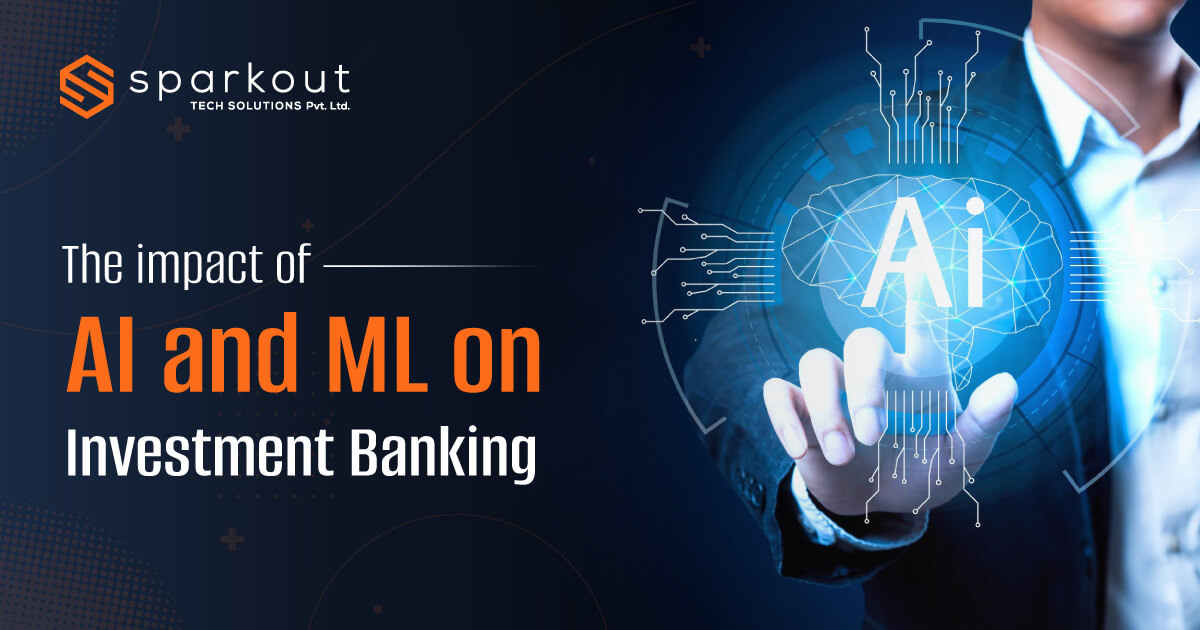The Banking sector has evolved quickly with the emergence of technology and the global pandemic, and clients expectations have expanded. The significant transition to online platforms has generated discussions regarding the need for a more satisfactory user interface. Given these modern technical advancements, Artificial intelligence and Machine Learning in banking are gaining popularity as banking institutions recognize the significance of automation for critical tasks.
Approximately 85% of top-level industrial decision-makers believe AI in investment banking will add meaning and benefits to their business procedures in the coming days, and ML is a promising market opportunity. Continue reading to learn more about the need for AI and ML in banking, as well as their benefits, drawbacks, and impact on investment banking.
What are AI and ML?
AI combines computer science and strong datasets to solve problems, while ML, a subfield of AI, enables software applications to generate more accurate predictions after evaluating massive amounts of data, significantly reducing risk for banks and financial institutions. With growing loan defaults, credit card fraud, identity theft, and money laundering, the need for banks to employ AI and ML has grown exponentially.
Banks and financial institutions are witnessing a growing market opportunity as they increasingly embrace AI and ML. According to research by Autonomous Next, the global potential cost reductions from AI applications for banks are projected to reach USD 447 billion by 2023.
Advantages of AI and ML in Investment Banking
AI and ML provide many advantages to investment banking. Here are several significant advantages:
Enhanced Data Analysis:
AI and ML systems can process massive volumes of data and identify patterns, trends, and correlations that humans might not recognize. This allows investment bankers to make better decisions based on detailed data analysis.
Improved Investment Strategies:
Machine learning algorithms can analyze historical market data to find successful investment strategies and predict future market trends. This assists investment bankers in optimising their portfolios, identifying potential dangers, and making more accurate investment decisions.
Risk Assessment and Management:
AI and ML models can analyze and manage risks by analysing market circumstances, financial data, the news outlook, and geopolitical events. This enables AI in investment banking to identify potential hazards in real time, adapt their investment plans, and establish effective risk management techniques.
Manual Task Automation:
AI and ML technology can automate repetitive and time-consuming operations, including data entry, data cleansing, and report preparation. This increases operational efficiency, decreases human errors, and allows investment bankers to focus on more strategic and value-added operations.
Personalized Customer Experiences:
AI-powered chatbots and virtual assistants can make personalized suggestions, respond to customer inquiries, and provide financial advice based on individual interests and goals. This improves client satisfaction and engagement, as well as the entire customer experience.
Real-time Market Insights:
AI and ML can analyse real-time market data, news feeds, social media trends, and other relevant sources to deliver up-to-date insights to investment bankers. This allows them to react swiftly to market developments, capitalize on investment opportunities, and stay ahead of the competition.
Cost Reduction:
AI and ML technology can help investment banks reduce operational expenses by automating routine tasks and optimising processes. This includes cost savings from enhanced efficiency, reduced errors, and more efficient resource allocation.
Disadvantages of AI and ML in Investment Banking
Data reliability and quality:
AI and ML systems rely largely on massive amounts of data to deliver accurate predictions and insights. AI in Investment banking deals with complicated financial data, and if the data used to train AI models is inadequate, erroneous, or biased, it can lead to poor decision-making and untrustworthy results.
Lack of transparency:
AI and ML algorithms are frequently referred to as "black boxes" because they can create predictions without providing clear explanations or reasons for their conclusions. ML in investment banking, where regulatory compliance and accountability are crucial, a lack of openness can be problematic.
Overreliance and loss of human judgement:
While AI and ML technologies can help with decision-making, relying on automated systems without human supervision can lead to a loss of critical thinking and intuition. Investment banking necessitates complex judgements and complicated decision-making, and mindlessly following AI projections may overlook critical elements that require human expertise.
Security and privacy Concerns:
AI and ML systems in investment banking manage massive volumes of sensitive financial and personal data. Concerns have been raised related to data breaches, hacking, and unauthorized access as these technologies have become more prevalent. Furthermore, when dealing with AI systems that handle and analyse personal and secret information, privacy standards and legal compliance become more difficult.
Cost and implementation issues:
Using AI and ML in investment banking requires large investments in infrastructure, talent recruitment, and ongoing maintenance.
Furthermore, integrating modern technologies with legacy systems can be complicated and time-consuming, possibly disrupting and delaying day-to-day operations.
Banks expand their investments in AI and ML technology
Considering the rate at which new technologies enable banks to improve decision-making and speed up customer service, a substantial number of banks are proposing to invest in AI and ML technology. By 2030, global annual spending on AI by banks and finance industries is expected to reach USD 64.03 billion. According to a recent IDC estimate, they are expected to spend an additional USD 31 billion on AI embedded in existing systems by 2025, with fraud management being the top priority. The impact of AI and ML in investment banking has been significant and competitive in the industry.
The Future of AI and ML in Investment Banking
Artificial intelligence and Machine learning in banking are still in their early stages, but they are rapidly evolving. As these technologies become more sophisticated and affordable, we should expect to see more widespread adoption in the financial industry. Here are a few instances of potential future applications:
Individualized financial advice:
AI and ML can be used to analyse consumer data and provide individualized financial advice. Individuals may be able to make greater financial choices as a result, increasing their financial well-being.
Underwriting automation:
AI and ML can be used to automate the loan and insurance underwriting processes. This could lead to faster processing times and more accurate risk assessments.
Fraud assessment:
Artificial intelligence and machine learning can be used to detect potential fraud in real time. This could help financial organizations prevent fraud and reduce financial losses.
AI and ML can be used to analyze market data and identify trends that may have an impact on investing. This could help financial companies make more informed investment decisions.
Final words
AI and ML will give banks a new level of accuracy in managing massive volumes of information and data gathered from customers, transactions, and other sources, allowing them to provide customized banking. It all comes down to who is best suited to adapt to the evolving environment of the investment banking industry. This could suggest learning new talents that will be useful in the future employment market. It is up to you to make good on AI's promise and ML's to reap the benefits of your work.
Please contact us if you want to learn more about integrating AI and ML in the investment banking sector.
 Translate
Translate


















Author Bio
Sivabharathy
Lead Project Manager
Sivabharathy is a technical architect, technology enthusiast, and voracious reader. His visionary perspective has earned him opportunities to work with innovative projects in the computer software industry. He is an expert in PHP, JavaScript, NodeJS, Angular, Ethereum, Web3, Product Development, and Teamwork.